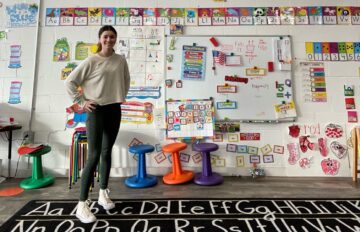Students pursuing passions beyond the classroom

Senior Sophia Stoicovy is among the 50-plus TJHS work-study students
Kenneth Gruntz, TJ’s Work-Study Coordinator and Industrial Technology teacher, simply describes the goal of the program to, “help prepare students for what comes next.” For high school students deciding on their next chapter, the possibilities are limitless. Gruntz believes that this program aids students based on their priorities, whether that be through, “valuable skills that help them in a future career … learn that a certain field is not for them … learn communication skills from a job … the benefits could be endless.”
Being a part of a program like this has been a dream for Gruntz since the beginning of his career, due to his experience in a work-study program at his own high school. His reasoning behind asking the previous administration to become involved at TJ was that he felt he, “benefited in many ways from my experience and I wanted to give that opportunity to students here.”
Regular communication with Gruntz for the spring semester’s 57 work-study senior students is vital to ensure they are performing academically to their full potential. He explained that each week the students, “check in with me and discuss any issues they may have.” He also highlighted that Canvas (the district’s online classroom instruction) is checked for missing assignments for each student, as well as weekly grade checks. For Gruntz, these students’ grades remain a high priority on top of their work-study commitment. “Teachers will report any students that may need additional support,” he added. Gruntz collaborates with the guidance department and TJ principals to verify the students are on track for graduating.
For evaluation of their work-study performance, Gruntz explained the grading process. For each student, they “are evaluated by their employers once each quarter,” are required to “keep a journal of the work that they completed as well as turn in schedules from their job,” and “complete an exit interview each semester.”
For Ayaan Ansari, the work-study opportunity has been beneficial. He is taking seven classes at Carnegie Mellon University (CMU) in math and computer science and joined a math club. After his CMU classes, he goes to the Starzl Transplantation Institute at UPMC Presbyterian, where he is, “analyzing flow cytometry data and doing T cell immunology experiments on mice.” His current project is, “developing a web-based application for the analysis of high dimensionality flow cytometry data.” His career path is steering towards neuroscience or possibly bioinformatics. Ansari describes his work-study involvement as a “wonderful experience” that allows him to truly, “learn about what I might do in a future career and what field best suits me.”
Ansari is an advocate for students considering work-study: “the experience has improved my time management skills, which I believe will be very useful in college.” He emphasizes that, regardless of your intended future, this opportunity could be utilized to, “discover what you truly want from a career,” finding that “there is a lot more to education than what happens in the classroom.” He defines the world as, “more competitive than ever,” which supports his opinion that “having hands-on experience will give you a major advantage over your peers.”
Another work-study student is Sophia Stoicovy, who plans to enter the education field, majoring in elementary education. She decided to do work-study at Tiny Tykes Academy, a daycare center for young children. However, her experience is slightly different as her work shifts alternate between the morning and the afternoon. “I work every day of the (school) week,” Stoicovy said. “My morning shift starts at seven and my afternoon shift is right after school.” She has thoroughly enjoyed her experience thus far, stating that her job is “so much fun getting to see the kids every day and grow as a person. I’ve created bonds with my co-workers and the kids.” When trying to juggle work-study as well as schoolwork for her core classes, Stoicovy assures that the task is attainable. Although handling both parts of her day can be challenging, she stresses that it’s “worth it.”
Stoicovy encourages anyone considering work-study to pursue it. She expresses that “if you don’t have a lot of required classes … doing work-study is super beneficial if you don’t want to load up on electives your senior year.” She believes that, by picking a job fit for one’s future or interests, work study is, “a lot of fun and something to look forward to during the week.”
Shawn McSwiggen describes his work-study experiences in the simplest of terms: “I love it.” His future plans are to study secondary education, primarily teaching social studies, with a possible minor or double major in special education. The work-study program was a fantastic way for McSwiggen to begin some hands-on training from teachers in our district. In the first semester of this year, he was at Pleasant Hills Middle School to observe and assist seventh grade Social Studies and Applied Engineering and Technology (AET). This semester he is furthering his teaching experience with fourth grade Math and Social Studies at Jefferson Hills Intermediate School.
McSwiggen plans to attend St. Vincent College. Reflecting on his experience in the work-study program, he feels he is strengthening his skills suitable for college as well as a potential occupation: “Getting a feel for the environment at each level and being able to teach material really prepares me for next year.”
The WJH administration’s goal is to continue to grow this program, making it as efficient and worthwhile for the students as possible. Erikka Kuhse, assistant principal at TJ, finds it crucial to “take feedback from the students and teachers involved and use it to our advantage.” By working together, Kuhse hopes to see a future of enhanced work-study success in our district. She urges anyone who is interested in aiding the school by providing resources to advance the program to reach out to the high school administration.

